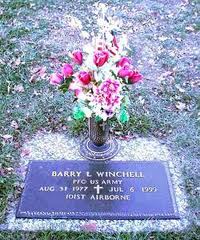I missed the racial integration of the U.S. military, but I witnessed up close the mixing of women into nearly every rank and file. Soon it will be time for openly gay men and women to serve, as well. I can recall the tirades against opening up more billets to women some 20 years ago. There was a special commission set up to deal with the issue, and tensions ran high following the notorious Tailhook convention in 1991, where Navy aviators groped and sexually assaulted women at a Las Vegas hotel.

PFC Barry Winchell, 1977-1999
That sad chapter finally pushed the Navy into action, and you could see it unfold the following year at its boot camp in Orlando, where men and women began training together for the first time. “I think we’ll see a decline in sexual harassment when these men and women, having trained side by side, get to their ultimate assignments,” Rear Adm. Leonard N. Oden, commander of the training center, said back then. “With a lot of hindsight, I’ve been asking myself why we didn’t start this integrated training back in 1973” when women first began training there.
That’s precisely the point advocates of repealing “Don’t Ask, Don’t Tell” have been making. The Pentagon actually bolstered their argument in its expansive troop survey, released last month. It showed that troops who had served alongside gays were far more comfortable with the notion of letting them serve openly than those who hadn’t.
In the years since, women have become a key piece of the U.S. war machine. Yes, the nation could have struggled to do without their services, but the resulting force would have been weaker for it. Granted, there have been occasional problems, like the recent news about a pair of Navy officers punished for fraternization while in command of a minesweeper, but stupidity knows no gender. Stories like these are newsworthy only because 99.99 percent of women in uniform, and their male colleagues, are saluting each other smartly and getting the job done.
It took another infamous, and far more serious, case in 1999 to highlight homophobia in the ranks of the U.S. military:
If it had been anyone else who stood up to Private Calvin Glover about his outrageous, macho bragging that summer night, things might have turned out differently. But it may have been just too humiliating to be challenged by Private First Class Barry Winchell, of all people. Glover was in full boast on the eve of July Fourth as he and his fellow soldiers drank beer around the concrete picnic table outside their barracks at Fort Campbell, Ky. “He would say he was on ‘smack’ since he was 10,” Private First Class Nikita Sanarov said, “and had been on probation since he was 12. Stuff like that.” Recalls Private First Class Arthur Hoffman: “He was just trying to make himself look like a badass. The stories were pretty out there.”
Finally one of the beer drinkers, Winchell, told Glover that he was full of it. Glover walked up to Winchell and tried to knock a beer from his hand but failed. Winchell insisted he didn’t want to fight, but something drove Glover to keep provoking one. Finally, Winchell tossed his beer aside and hit Glover quickly several times with the heel of his hand. As Glover reeled backward, Winchell grabbed him around the waist and threw him to the ground. That should have been the end to an ordinary fight, but for Glover the stakes were higher. He had just been beat by a man whose suspected homosexuality had preoccupied the barracks for months. “It ain’t over,” Glover vowed to Winchell. “I will…kill you.”
Forty-eight hours later, Winchell was dead. Eleven years later, “Don’t Ask, Don’t Tell” is, too.
In another 11 years, we’ll wonder just how “Don’t Ask, Don’t Tell” ever became the law of the land, and why it was allowed to stand for 17 years and ruin the careers of nearly 14,000 people.


